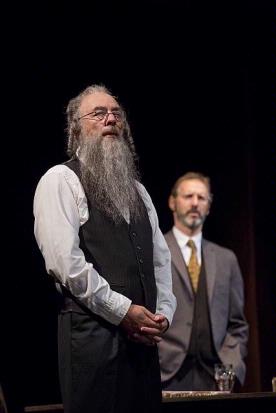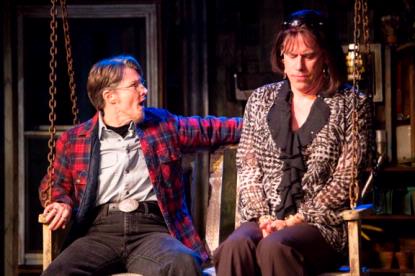Two shows on Barrington Stage’s two stages look at dichotomies in the fabric of American life—on the fringes of that fabric, perhaps. In The Chosen, two worldviews clash, mingle and reconcile through the friendship of two Jewish boys in postwar Brooklyn. In Southern Comfort, a new musical based on a true life story, a transgender community takes root in today’s redneck South.
Meghan Raham’s set for The Chosen (playing through August 3) consists of high walls of bookshelves, through which we can glimpse the girders of the Williamsburg Bridge and which define the homes of yeshiva students Reuven and Danny and their respective fathers—two families living within blocks of each other in a New World ghetto, united by an embattled faith but nonetheless separated by deep cultural divides.
Adapted from Chaim Potok’s 1967 novel by the author and Aaron Posner, who also directed this production, the stage version faithfully and efficiently condenses Potok’s semi-autobiographical narrative onto a five-actor canvas. In this richly compelling, deliciously acted production, Richard Topol is the author’s storyteller, the grown-up Reuven looking sympathetically back on his teenage self, an observant Jew but not one of the super-pious Hasidim on the other side of the neighborhood.
One of those is Danny, son and presumptive heir of Reb Saunders, leader of the ultraorthodox community he guided, Moseslike, out of the Russian pogroms. The two boys meet and clash in an inter-school baseball game—thrillingly mimed—and become friends, each one puzzled and intrigued by the other’s outlook and lifestyle. As Reuven and Danny, Jeff Cuttler and Ben Rosenbach are wonderful: young men in their twenties convincingly embodying the boys’ adolescent yearnings and impulses—Cuttler open-faced and open-hearted, Rosenbach’s Danny serious to the point of grim but bursting with guilty, even heretical ambitions and interests.

The boys’ fathers are even more polar personalities. Adam Heller, who appeared here last season in My Name is Asher Lev, another Potok work, is Reuven’s dad—passionate and explosive, a Zionist convinced that after the horror of the Holocaust, Judaism must be reformed to be revived. He’s a kinetic presence, almost unable to sit still when provoked by ideas or emotions. By contrast, Richard Schiff’s rebbe is stern, still and silent, until finally provoked to volcanic fury by the six million dead and the secular, socialist Zionists, whom he condemns as “Jewish goyim.” You wouldn’t recognize Toby Ziegler, Schiff’s career-defining role in The West Wing, underneath Reb Saunders’ full beard and dangling peyos, were it not for the alert, darting eyes and the quiet words that flow over deep waters.
Across the top of the proscenium, linking and sheltering the two households, is a legend in Hebrew that translates as “Both these, and these, are words of the living God.” That Talmudic puzzle is illustrated in the scenes in Reb Saunders’ study, where historical disputations over contradictory propositions are resolved through dialectical examination and interpretation. And it’s worked out in the drama through the younger generation’s rebellious searching, the elders’ antithetical convictions about the very future of Judaism, and the families’ ultimate synthesis of repudiation into acceptance—the unity of opposites.
Jes’ Folks
You could say there’s also a dialectic at work in Southern Comfort (on Barrington’s St. Germain Stage through August 10). Here, the hard-won unity is forged from the people and the place. This world premiere, nurtured in William Finn’s Musical Theatre Lab, is based on Kate Davis’ 2001 documentary of the same name, which followed Robert Eads and his “chosen family” during the last year of his life. He was a transgendered man who died—ironically, you might say—of ovarian cancer.
That anomaly—a man with a uterus—is just one of the seeming contradictions that give scope and spirit to this precedent-breaking production. Another is that the members of this trans clan live not in Frisco or SoHo (or Noho, for that matter) but in the back country of rural Georgia, what Eads called “Bubba-land.” Yet another is that the play’s six couples are not alternative-lifestyle rebels but jes’ plain folks who dance to country music and bring Snicker salad to potlucks.
And another is that in this necessarily tight-knit community, difference makes no difference on more levels than you might expect. Robert is a small, wiry man (Annette O’Toole, in an astonishing, thoroughly convincing performance, complete with impish swagger and wispy chin whiskers), while his girlfriend, Lola, is a foot taller than he and built like a linebacker. Jeff McCarthy is wonderfully shy and self-conscious as Lola, who is just beginning the journey and still lives as “John” in the outside world, where at one point she scolds Robert for “barging in on me when I’m not myself.”
There’s no gender switching in the rest of the cast. Biological males play the f-to-m roles and vice versa. One of the women, Melanie (Robin Skye), is a cisgender female, married to f-to-m Sam (Todd Cerveris), who still has his “ladyparts.” But that reality (not an anomaly in the trans community, I gather) makes them no less a hetero couple.
However, that inconsistency does present an issue for Jackson (Jeffrey Kuhn), the most guy-guy of the bunch. Born Peggy Sue, he’s determined to undergo the expensive and painful surgery for gender reassignment (aka, perhaps more accurately, as gender confirmation). Which in turn poses an issue for the others, including his m-to-f girlfriend Carly (Natalie Joe Johnson), who see no point or necessity for it. As Robert insists, “It goes and reduces gender back to what’s between the legs.”

The script by Dan Collins, who also wrote the lyrics to Julianne Wick Davis’s music, embraces these and other conundrums, which sometimes made this cis-y’s head spin, but neither hammers nor dwells on them. Indeed, director Thomas Caruso has conspired with set designer James J. Fenton to make us, in effect, simply part of the furniture in Robert’s home. We enter the theater past homey knickknack racks made from orange crates and through an arbor gate into a backyard where a four-piece string band is tuning up on the porch (with music director Emily Otto perched at a keyboard inside the house).
The four singer/musicians—fiddler Joel Waggoner, basswoman Lizzie Hagstedt, multi-instrumentalist David Lutken and percussionist Elizabeth Ward Land, who also has the strongest country voice in the cast—double as actors, stepping out for cameos as various outsiders, including Robert’s parents, who still call him “Barbara,” a flirty housewife in Lola/John’s shop, the surgeon describing the phalloplasty procedure to Jackson, and others. The acoustic lineup gives the score a unified sound and semi-country feel, even when the music itself owes more to New York than Nashville. To my ear, a more coherent country/bluegrass style would better support the story, milieu and performers.
Nevertheless, many of the songs are spot-on, neatly landing cogent and/or humorous points. Like the three men singing teasingly but appreciatively about women: “Lord, they were never this way, back when I used to be one.” And a sexy duet between Jackson and Carly, both of them getting excited in “places that aren’t even there.” And Lola’s terrified aria about driving “Two Hundred Miles” with Robert to find an emergency room willing to take him in.
The title of the piece refers not only to the reassurance and support these friends gain from each other (as well as to that quintessentially southern beverage, so sweet and soothing) but also to Southern Comfort, an actual transgender conference held yearly in Atlanta—a national gathering of the trans community (“It’s like a big ol’ family reunion,” says Melanie, “but a good one”) which is the centerpiece of Act Two.
The comfort level gets a wee bit cozy in places, as the play and players strain to convince us they’re ordinary folks, no big deal. Or perhaps the characters need to keep reminding themselves of that, in a world that for the most part still considers them freaks. But notwithstanding occasional slips into sentimentality—like the misty saving-the-farm conclusion—we can gladly applaud this exuberant, brave, eye-opening and heart-grabbing adventure in musical theater.


